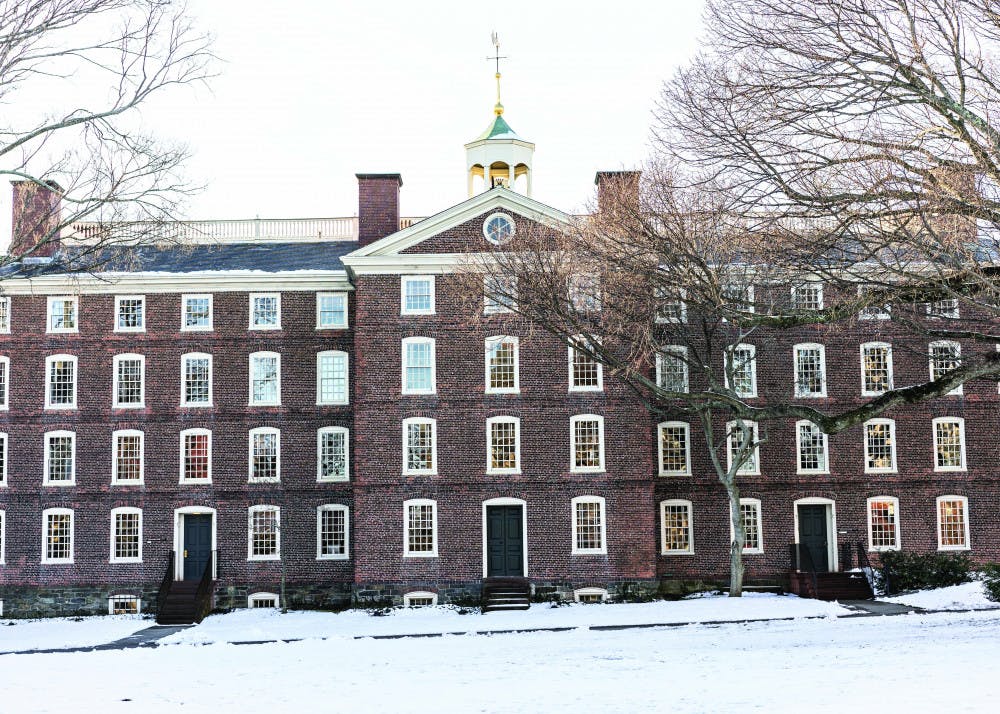Updated Nov. 4, 2015 at 2:16 p.m.
The campus climate around freedom of speech featured prominently in remarks from both President Christina Paxson P’19 and Provost Richard Locke P’17 at a faculty meeting Tuesday. Paxson underscored Brown’s complementary roles as a place of open inquiry and an "inclusive" space for every student, and Locke unveiled a series of lectures and workshops around issues of race, gender and justice.
Attendees also discussed a potential Winter Session, the BrownTogether fundraising campaign, Title IX training requirements for faculty members, research grant procedures and departmental evaluation standards.
“A lot of issues around diversity, inclusion, racism and freedom of expression are really active at Brown right now,” Paxson said, adding that, as Brown’s student population continues to diversify, this discussion is “not surprising, and in some sense welcome.”
Some Corporation members asked if she could make national headlines around campus issues go away, Paxson said, and she replied she could not. Potentially turbulent conversations are a staple of college campuses, she said, adding that those conversations will be supported as long as Brown remains a welcome space for all students.
Locke announced a discussion series that will help frame campus conversations on race, gender identity, class and health care, to begin later this semester. Students and faculty members are meeting with the provost to develop these lectures, which will draw on both student and faculty expertise, as well as outside practitioners, wrote Marisa Quinn, chief of staff to the provost, in an email to The Herald.
The goal is to “show that we can support a diverse community and a diverse intellectual community,” Locke said.
A forum to allow faculty members to share their work with one another is also under way, with the hope that “providing these opportunities can help build community and perhaps inspire increased collaboration across disciplines,” Quinn wrote.
A Faculty Forum on Winter Session will occur Nov. 17, Paxson said. She added that the latest proposal for the possible January academic term has three benefits. First, the session in its current iteration would not cause a change in the school year calendar, she said. Second, students would have the opportunity to graduate a semester early through use of optional Winter Session courses — though total tuition would remain the same. Finally, faculty members would be able to approach teaching in a more flexible way, as Winter Session offerings would fulfill regular faculty teaching requirements and free up time for scholarship during the rest of the academic year.
Paxson also ran through a financial breakdown of the recently announced BrownTogether comprehensive campaign. Half of the $3 billion raised will enter the endowment with the goal of providing for Brown’s future. The University can only access a small portion of the endowment for current use, she said.
About $410 million from the campaign is allotted for faculty chairs, positions funded with endowments that cover salaries and some benefits. Faculty chair positions currently support 16 to 17 percent of the faculty, a figure much lower than the 50 percent at some peer institutions, Paxson said.
The $600 million allocated for campus and community will include some new buildings but will largely focus on improvements to existing ones, she added.
Locke urged faculty members to complete the required Title IX online training program before next week’s deadline.
Released to faculty Oct. 1, currently only 33 percent of faculty members have completed the training, compared to 52 percent of staff members, he said. It is the “bare minimum that we’re all trained,” so that “all of our students when they come here can truly be safe and learn,” he said.
Chair of the Faculty Executive Committee Thomas Roberts gave a report on resources for faculty members related to research, particularly grants given by the Office of Sponsored Projects.
Roberts said the University will address “excessive risk aversion” relating to federal guidelines for grant allocation. Brown should not be stricter in its application of grants than the regulating organizations, he said. Instead of policing or gatekeeping, the administrative component should serve as a problem-solving partner when details or logistics of the research are in question, Roberts said. The University will then create focus groups to determine which research services are currently working and which need an overhaul, he added.
Dean of the Faculty Kevin McLaughlin P’12 led a discussion of departmental evaluation standards. The administration asked departments which criteria should be evaluated in order to determine faculty promotions and tenure, among other departmental decisions.
Departments identified 56 different categories, McLaughlin said, with 10 categories appearing in a high consensus across departments polled. The categories included peer-reviewed articles, monographs, peer-reviewed book chapters, invited lectures, faculty awards and fellowships, research graphs, PhD placement, faculty diversity and grad student diversity.
The goal is to establish four or five consensus criteria and track them accordingly, McLaughlin said, adding that some departments will be more idiosyncratic in evaluation standards depending on their line of work.
The faculty also held a memorial minute for Lecturer Emeritus in Theatre, Speech and Dance John Lucas, who passed away Aug. 29.





